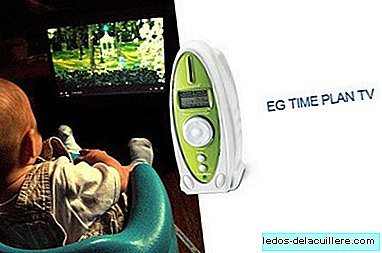
A couple of years ago when I look at the catalog of Imaginarium I ran into him Eg Time Plan TV and every time I see him I throw my hair (literally no, of course), observing what is possibly the worst possible invention to try to limit the time children spend on television.
It is a machine that, connected to the television, manages the viewing time using coin-tokens, just as televisions usually work in hospital rooms. You put a coin and the television works for a certain time (in this case 30 minutes per coin).
As can be read in the instruction manual, thanks to this device children can learn to manage their own time on television, since it is understood that they will have one, two or three (or more) daily cards, and they will use them themselves when they create better, and they can also serve (coin-tokens) as an "educational" tool for parents in the form of a prize.
I imagine that reading this many will think since the invention brings them and that it is not recommended at all, even so, if you want to read my arguments I leave them below:
The forbidden becomes the desired
“If you want your child to stop doing something, force him to do it until he is done. If instead you want me to do something, forbid it. ” This phrase comes to summarize what happens in the heads of children (and adults). It is not a recommendation that works 100%, because there are children who do follow the instructions of their parents, but it is well on the way to the wishes of the children and the scale of values they create.
At the moment we place a device to control the television viewing time we are giving the television an excessive relevance. We are giving you a value that you don't have and that many children often don't even feel.
At the moment we say "take two chips for today", we are limiting the television time to one hour, in two 30-minute stripes, which the child will begin to value too much, to the point of wanting to use up the 30 minutes when you are not interested in what is being broadcast.
If television becomes a prize, more is still desired
According to the manual, the cards can be used as a prize, to encourage children. We have already spoken on other occasions about the awards and I repeat it again today because it is relevant. Children have to do things because they want to do them or because they must be like that, not to get a 30-minute television coin.
If I want my child to behave properly, do not disturb, do not hit or pick up what he stains, I will tell him that I want him to behave well because if he will not disturb others, I will tell him not to hit because it hurts and because nobody He likes to be hit and I will tell him to pick up what he stains because if I don't have to do it and because he has to bear the consequences of what he does (although I will help him clean if necessary). But I will not tell you to behave well, not to bother, not to hit, to pick up or whatever I want in exchange for 30 minutes of television, because that is not educating in values, that is to banal important things by creating an absurd extrinsic motivation.
-Manolito, if today you do not hit your cousin Claudia I give you a television coin - says the mother to Manolito.
Two hours later Manolito approaches Claudia and hits her mother's perplexed look.
- Manolito is over, because you've run out of TV! Today there is no currency!
Manolito meanwhile think about how boring television was going to be today, that being Thursday they do not broadcast their favorite series and how, weighing between currency and hitting Claudia has chosen the latter, since losing the former was not too problematic.
The example is very simple (too much) and children probably don't think that way, but it is the way to show that when the motivation for an act comes from outside, it is so weak that it can fall at any moment. Instead, if we get it to be intrinsic, for the child to think he should act like this because he wants to be like that, it will take much more for the child to change his attitude, because it will be part of your values and beliefs.
Giving education to a device
Another of the mistakes is that, being as we are the parents, wanted and pointed out by our lack of authority before our children, let's fall into the error of giving education to a device: "I do not say no, it is the device that turns off", which reminds me of those situations in which, in my work in a primary care center, I see mothers who say to their children "behave well that if not boy will make you angry ”. Of course, because if the boy does not see you, you can do what you want, which does not bother me, but of course, the boy may be and he will educate you.
A suggestion to obviate said device
It cannot be that I criticize an apparatus that has a specific purpose and not an alternative, so I will give it right now, based on my personal experience.
In my house, television is one of many gadgets, hookahs and toys that make up our home. Whoever wants turns it on and sees it. Thus, without restrictions, unless it is time to go to bed and have to turn it off (logical).
Far from having two children stuck at all hours in front of the television as many could imagine, I have two children who turn it on often, who watch 5 or 10 minutes of television and then go to play with other things. Sometimes the weather is longer and sometimes they spend very hooked seasons, usually because they have seen a movie they liked and want to see it again day and day too.
When this novelty ceases to be, television returns to its status as "one more toy", sometimes spending whole days without being turned on, in the same way that there are toys that spend whole days without being touched.
To reach this situation nobody has given any importance to television, nobody has punished anyone without it and nobody has used television as a prize (because this is another ... what is the point of limiting something because you think it is not educational and then put the children in front of you at your convenience because they have done something right?).
What has been done at specific times is offer alternatives. If we have thought that they should change their air for whatever reason, we have offered them to read a story with them or play something, usually more fun than television. To date it has never failed.












